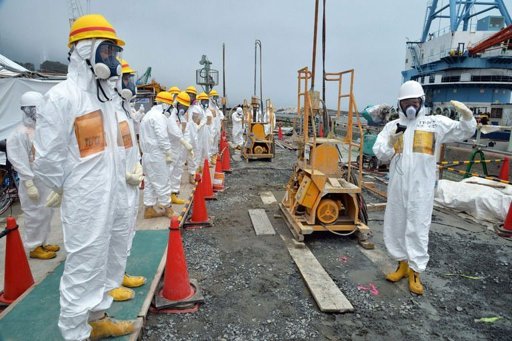Japan Wednesday issued its strongest warning about the crippled Fukushima nuclear plant since the crisis began in 2011, as it struggled to seal a tank that has leaked 300 tonnes of radioactive water.
Plant operator Tokyo Electric Power Co (TEPCO) said some of the water might have flown into the Pacific Ocean.
Nuclear regulators said the leak represented a level-three "serious incident" on the UN's seven-point International Nuclear Event Scale (INES), which measures radiation accidents.
"Something that we were very much concerned about has occurred," Nuclear Regulation Authority (NRA) chairman Shunichi Tanaka told a meeting in Tokyo. "We are in a situation where there is no time to lose."
The alert, raised from level one which indicates an "anomaly", is the most serious declared at the ruined plant since March 2011, when a quake-generated tsunami knocked out reactor cooling systems and sparked meltdowns.
At its height the Fukushima disaster was classified as level seven -- one of only two events ever rated in that category along with the Chernobyl disaster in 1986.
The NRA said in a statement the amount of radiation leakage and the "fact that there is no safety protective layer remaining at the facility" meant the level-three warning needed to be declared.
It will now consult the International Atomic Energy Agency (IAEA) on the reassessment, it said.
In Vienna IAEA spokeswoman Gill Tudor said the agency "views this matter seriously and remains ready to provide assistance on request".
Japan's top government spokesman, chief cabinet secretary Yoshihide Suga, said the incident was "extremely deplorable".
"The government as a whole will do its utmost to prevent the leakage of contaminated water as promptly as possible," he told a news conference. "We will make a proper assessment after consulting the IAEA."
The evaluation came a day after TEPCO said some 300 tonnes of radioactive water was believed to have leaked from one of the tanks that hold water, including water used to cool the unstable reactors.
It said water puddles near the tank were so toxic that anyone exposed to it would receive the same amount of radiation in an hour that a nuclear plant worker is allowed to receive in five years.
The plant lies inside a 20-kilometre (12-mile) exclusion zone and the public is not allowed near it.
TEPCO said the leak was thought to be continuing on Wednesday and it had not yet pinpointed the exact source.
It was also "hurriedly checking" if any of 350 similar tanks were also leaking.
"We must carefully deal with the problem on the assumption that if one tank springs a leak the same thing can happen at other tanks," the NRA's Tanaka said.
A TEPCO official said the company was removing contaminated soil and sucking the remaining water from the leaky tank.
He said there were no significant changes in radiation levels outside the plant.
But the utility admitted late Wednesday that some of the water might have flowed to the sea through a drain near the troubled tank.
TEPCO spokesman Tsuyoshi Numajiri said traces of radioactivity were detected in the drain leading to the sea.
"We cannot rule out the possibility that part of the contaminated water flowed into the sea."
On the Tokyo Stock Exchange, shares in TEPCO plunged 9.28 percent to 557 yen ($5.70).
The company -- which faces huge clean-up and compensation costs -- has struggled to cope with the disaster.
Its most serious problem is how to handle the massive amount of water accumulating as a result of continuing water injections to cool the reactors, which has been stored in the hastily built tanks.
The utility in July admitted for the first time that radioactive groundwater had been leaking outside the plant.
This month it started pumping it out to reduce leakage into the Pacific.
"Problems with contaminated water have emerged one after another," Kenzo Oshima, a Nuclear Regulation Authority commissioner, told Wednesday's meeting.
"TEPCO has been struggling and is likely to continue to do so from now on," Oshima said.
The problems have led the Japanese government and the NRA to say they would become more directly involved in the cleanup at Fukushima.
While no one is officially recorded as having died as a direct result of the meltdowns, large areas around the plant had to be evacuated.
Tens of thousands cannot return to their homes inside the zone.


















































